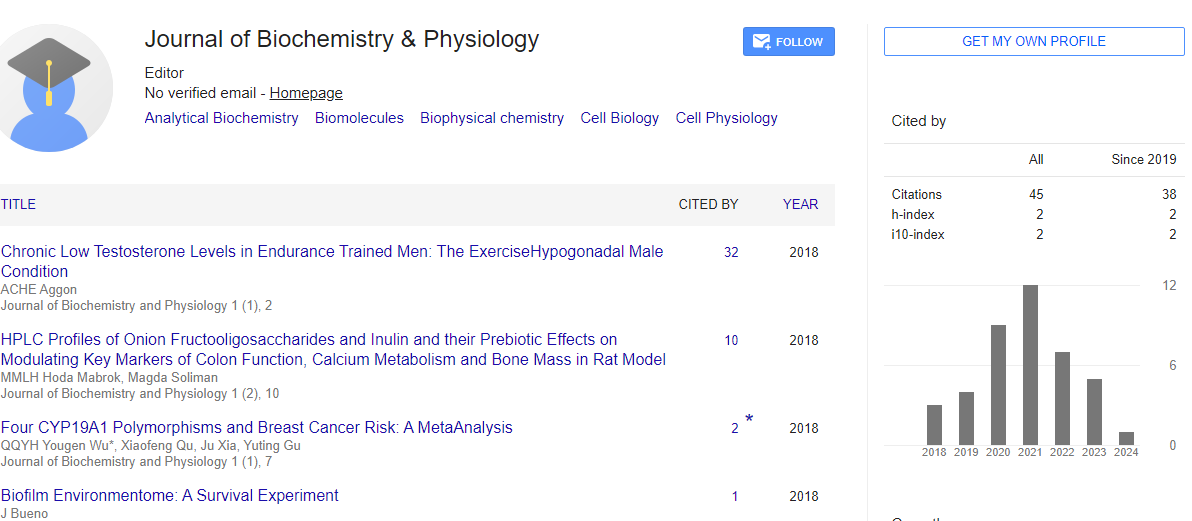Opinion Article, J Biochem Physiol Vol: 7 Issue: 4
Role of DNA Manipulation in Developing Next-Generation Therapeutics
Rhylar Myros*
1Department of Molecular Biology, University of Lyon, 46 Allée d’Italie, France
*Corresponding Author: Rhylar Myros,
Department of Molecular Biology, University
of Lyon, 46 Allée d’Italie, France
E-mail: rhylar.myros@munsvu.com
Received date: 23 November, 2024, Manuscript No. JBPY-24-154537;
Editor assigned date: 25 November, 2024, PreQC No. JBPY-24-154537 (PQ);
Reviewed date: 09 December, 2024, QC No JBPY-24-154537;
Revised date: 17 December, 2024, Manuscript No JBPY-24-154537 (R);
Published date: 24 December, 2024, DOI:10.4172/jbpy.1000178.
Citation: Myros R (2024) Role of DNA Regulation in Developing Next-Generation Therapeutics. J Biochem Physiol 7:4.
Description
The regulation of DNA has revolutionized modern medicine, offering innovative solutions to treat diseases at their root cause. This transformative approach involves altering the genetic code to correct mutations, regulate gene expression or produce therapeutic proteins. DNA regulation has emerged as a foundation of next-generation therapeutics, with applications spanning gene therapy, personalized medicine and regenerative treatments.
One of the most significant applications of DNA manipulation is gene therapy, which targets genetic disorders by correcting or replacing defective genes. By directly addressing the genetic root of a disease, gene therapy offers the potential for long-term or even permanent cures. Diseases such as cystic fibrosis, hemophilia and certain types of inherited blindness have been the focus of innovative gene therapy trials. Techniques such as viral vectors, which deliver functional copies of genes into patient cells, have shown promise in clinical applications. The success of these methods demonstrates the immense potential of DNA manipulation in treating diseases that were once considered incurable.
Advances in gene-editing tools like CRISPR-Cas9 have further expanded the horizons of DNA manipulation. CRISPR technology allows accurate and efficient editing of the genome, enabling scientists to add, delete or modify specific genetic sequences. This accuracy has opened new avenues for treating complex conditions like cancer and neurodegenerative diseases. In addition to treating genetic disorders, DNA manipulation has played a important role in the development of personalized medicine. By altering treatments to an individual’s genetic profile, healthcare providers can achieve more effective and targeted outcomes. DNA sequencing technologies enable the identification of genetic mutations or polymorphisms that influence a patient’s response to specific drugs. Using this information, therapies can be designed to maximize efficacy while minimizing side effects. The integration of DNA manipulation with personalized medicine represents a basic change in how diseases are diagnosed and treated.
Regenerative medicine is another field benefiting from advancements in DNA regulation. Scientists have attached this technology to engineer stem cells and promote tissue regeneration. Induced Pluripotent Stem Cells (iPSCs), created by reprogramming adult cells through DNA manipulation, hold the potential to repair damaged tissues or organs. These cells have shown promise in treating conditions such as spinal cord injuries, heart disease and diabetes. The ability to manipulate DNA to create patient-specific stem cells minimizes the risk of immune rejection, further enhancing the possibility of regenerative therapies.
Moreover, DNA manipulation has been instrumental in vaccine development, as evidenced by the rapid creation of mRNA vaccines during the COVID-19 pandemic. These vaccines depend on synthetic DNA templates to produce messenger RNA that instructs the immune system to recognize and fight pathogens. The speed and efficiency of mRNA vaccine development feature the potential of DNA manipulation in responding to emerging infectious diseases. Beyond infectious diseases, DNA-based vaccines are being used for cancer immunotherapy, offering another dimension to next-generation therapeutics.
Despite these advancements, DNA regulation faces several challenges. Ethical concerns regarding genome editing, especially germline modifications, have generated intense debate. Altering the DNA of embryos could have involuntary consequences for future generations and raises questions about equity and accessibility. Additionally, technical challenges such as off-target effects and the delivery of therapeutic genes to specific tissues need to be addressed to ensure the safety and efficacy of DNA-based treatments. Continued research and strict regulatory oversight are essential to reduce these risks.
Conclusion
The regulation of DNA has lead in a new era of next-generation therapeutics, offering hope for treating previously tough diseases. From gene therapy and personalized medicine to regenerative treatments and vaccines, DNA manipulation continues to reshape the landscape of modern medicine. As science progresses, the potential for DNA manipulation to improve human health and comfort remains boundless, signaling future where genetic disorders and other complex diseases may no longer pose impossible challenges.
 Spanish
Spanish  Chinese
Chinese  Russian
Russian  German
German  French
French  Japanese
Japanese  Portuguese
Portuguese  Hindi
Hindi 